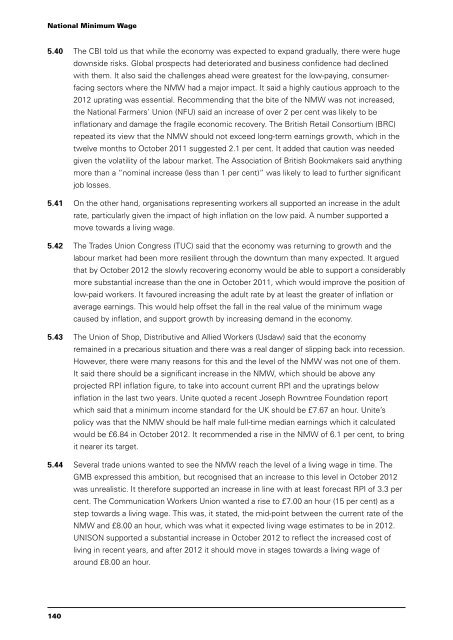National Minimum Wage
National Minimum Wage
National Minimum Wage
You also want an ePaper? Increase the reach of your titles
YUMPU automatically turns print PDFs into web optimized ePapers that Google loves.
<strong>National</strong> <strong>Minimum</strong> <strong>Wage</strong><br />
5.40 The CBI told us that while the economy was expected to expand gradually, there were huge<br />
downside risks. Global prospects had deteriorated and business confidence had declined<br />
with them. It also said the challenges ahead were greatest for the low-paying, consumerfacing<br />
sectors where the NMW had a major impact. It said a highly cautious approach to the<br />
2012 uprating was essential. Recommending that the bite of the NMW was not increased,<br />
the <strong>National</strong> Farmers’ Union (NFU) said an increase of over 2 per cent was likely to be<br />
inflationary and damage the fragile economic recovery. The British Retail Consortium (BRC)<br />
repeated its view that the NMW should not exceed long-term earnings growth, which in the<br />
twelve months to October 2011 suggested 2.1 per cent. It added that caution was needed<br />
given the volatility of the labour market. The Association of British Bookmakers said anything<br />
more than a “nominal increase (less than 1 per cent)” was likely to lead to further significant<br />
job losses.<br />
5.41 On the other hand, organisations representing workers all supported an increase in the adult<br />
rate, particularly given the impact of high inflation on the low paid. A number supported a<br />
move towards a living wage.<br />
5.42 The Trades Union Congress (TUC) said that the economy was returning to growth and the<br />
labour market had been more resilient through the downturn than many expected. It argued<br />
that by October 2012 the slowly recovering economy would be able to support a considerably<br />
more substantial increase than the one in October 2011, which would improve the position of<br />
low-paid workers. It favoured increasing the adult rate by at least the greater of inflation or<br />
average earnings. This would help offset the fall in the real value of the minimum wage<br />
caused by inflation, and support growth by increasing demand in the economy.<br />
5.43 The Union of Shop, Distributive and Allied Workers (Usdaw) said that the economy<br />
remained in a precarious situation and there was a real danger of slipping back into recession.<br />
However, there were many reasons for this and the level of the NMW was not one of them.<br />
It said there should be a significant increase in the NMW, which should be above any<br />
projected RPI inflation figure, to take into account current RPI and the upratings below<br />
inflation in the last two years. Unite quoted a recent Joseph Rowntree Foundation report<br />
which said that a minimum income standard for the UK should be £7.67 an hour. Unite’s<br />
policy was that the NMW should be half male full-time median earnings which it calculated<br />
would be £6.84 in October 2012. It recommended a rise in the NMW of 6.1 per cent, to bring<br />
it nearer its target.<br />
5.44 Several trade unions wanted to see the NMW reach the level of a living wage in time. The<br />
GMB expressed this ambition, but recognised that an increase to this level in October 2012<br />
was unrealistic. It therefore supported an increase in line with at least forecast RPI of 3.3 per<br />
cent. The Communication Workers Union wanted a rise to £7.00 an hour (15 per cent) as a<br />
step towards a living wage. This was, it stated, the mid-point between the current rate of the<br />
NMW and £8.00 an hour, which was what it expected living wage estimates to be in 2012.<br />
UNISON supported a substantial increase in October 2012 to reflect the increased cost of<br />
living in recent years, and after 2012 it should move in stages towards a living wage of<br />
around £8.00 an hour.<br />
140


